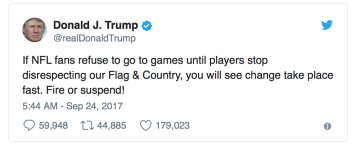African-American individuals are frequently under fire for protesting in ways people call inappropriate. This begs the question: Is there a correct way for African-Americans to protest?

In 2016, Colin Kaepernick, quarterback of the San Francisco 49ers, refused to stand during the National Anthem before a game.
“To me, this is bigger than football,” Kaepernick told NFL Media in an interview. “I am not going to stand up to show pride in a flag for a country that oppresses black people and people of color.”
Both the San Francisco 49ers franchise and NFL released statements, expressing the importance of the flag, but respecting Kaepernick’s right to protest for his beliefs. The First Amendment of the United States Constitutions states: “Congress shall make no law respecting an establishment of religion, or prohibiting the free exercise thereof; … or the right of the people peaceably to assemble.”
Kaepernick was named GQ Magazine’s “Citizen of the Year.” The article, entitled “Colin Kaepernick Will Not Be Silenced,” explains the reason behind his protest and people’s response to his actions.
Colin Kaepernick is using his platform as a high-profile athlete to start a conversation.

This is not the first instance of protest in a professional sports setting.
Since 1968, when African-American track athletes Tommie Smith and John Carlos made their black-power Olympic salutes, people have critiques the peaceful protests of the African-American community.
According to Sporting News, NFL ratings are seven percent lower than they were at this point in the 2016 season and 18 percent lower than the 2015 season. The protests are considered part of the reason for the decreased viewership.
Lattana Sithara, sophomore biology major and member of the women’s tennis team, thinks protesting the flag is not the correct way to protest African-American oppression.
“I think that there is a more suitable form of protest in sports that will not offend others who enjoy watching the sport,” Sithara said.
Luke McDevitt, freshman education major, is a member of the men’s swim team. He agrees that athletes have better platforms for protesting.
“You don’t play a game for the political reasons. You play to see who is the best [athlete],” McDevitt said. “A professional athlete can do all of [their protesting] on their social media.”
Tommie Smith, John Carlos, Vince Matthews, Wayne Collett, Mahmoud Abdul-Rauf and now Colin Kaepernick are all men of color who have experienced backlash for peacefully protesting the national anthem.
If peacefully abstaining from the anthem is too radical of a protest, many African-American individuals are unsure of how to protest. People agree that there is no clear answer to this question of how to protest.
“There is no correct way to protest because their protest is reflected by what the individuals feel will justify their actions,” Sithara said.
Some appreciate Kaepernick’s stance, while others think his actions are disgraceful.
Though Sithara believes there is a better way for Kaepernick to protest, she still understands his decision.
“I believe that each athlete is entitled to their own opinion and has a choice to do what they feel is best for what they stand for or believe in,” Sithara said. “If they felt as though their rights or beliefs were attacked in some form and want to take a stand by using their platform, they can.”


